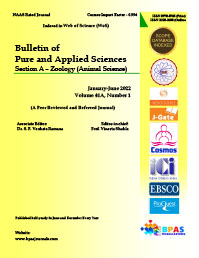A Comparative Study of the Nutrient Intake by Anaemic and Non Anaemic Adolescent Girls (16-18 years)
DOI:
https://doi.org/10.48165/Keywords:
Nutrient Intake, Adolescent, Girls, Anaemic, Non-AnaemicAbstract
Malnutrition is an ever growing health problem recognised in the present adolescents today. The present study was undertaken to assess the nutrient intake of Adolescent girls (16-18 years) in Ajmer city and to make a comparative study of the Anaemic and Non Anaemic subjects. Anthropometric measures, biochemical investigation to assess the Haemoglobin levels in the subjects and dietary survey through 24 hour recall method for three consecutive days were measured from 250 subjects by using standard techniques. On an average the subjects of anaemic groups consumed significantly less (P <0.01) Energy, Protein, Iron, Vitamin A, Folic acid, Niacin, Ascorbic acid and Fibre. The non anaemic group had their nutrient intakes which were less than the Recommended Dietary Allowances (RDA), but the intakes of almost all the nutrients were even lesser in the anaemic group than the ones in the Non Anaemic group. The prevalence of anaemia in the girls of adolescent age group might be related to dietary deficiencies and perhaps poor dietary patterns. The present study undertaken indicated that those subjects who had deficient nutrient intake in their diet would have a higher risk of anaemia as compared to normal or overweight subjects.
Downloads
References
Stump S.E., Mahan L.K., (2008): ‘Krause’s Food and Nutrition Therapy’ 12thEd. Elsevier Publishers Canada. pp- 250-258.
Akseer N., Al-Gashm S., Mehta S., Mokdad A., Bhutta Z.A. (2017): ‘Global and regional trends in the nutritional status of young people: a critical and neglected age group.’ Annals of the New York Academy of Sciences ; 1393: pp 3–20.
Patton G.C., Sawyer S.M., Santelli J.S., Ross D.A., Afifi R., Allen N.B., Arora M., Azzopardi P., Baldwin W., Bonell C., et al. (2016): ‘Our future: A Lancet commission on adolescent health and wellbeing. Lancet’ ; 387 : pp 2423–2478
Ladipo O.A. (2000): ‘Nutrition in pregnancy: Mineral and vitamin supplements’. Am. J. Clin. Nutr. ; 72: pp 280S–290S.
Onyango A.W.(2013): ‘Promoting healthy growth and preventing childhood stunting: a global challenge.’ Maternal & Child Nutrition ; 9 (Suppl. 2): pp 1–5.
Srilakshmi B. (2008): ‘Dietetics’. Revised 5th Ed. New age International Publishers, New Delhi. pp- 82.
Caleyachetty R., Thomas G.N., Kengne A.P., Echouffo-Tcheugui J.B., Schilsky S., Khodabocus J., Uauy R. (2018): ‘The double burden of malnutrition among adolescents: analysis of data from the Global School-Based Student Health and Health Behavior in School-Aged Children surveys in 57 low- and middle-income countries.’ Am. J. Clin. Nutr.; 108: pp 414–424.
Keats E.C., Rappaport A.I., Shah S., Oh C., Jain R., Bhutta Z.A. (2018): ‘The Dietary Intake and Practices of Adolescent Girls in Low- and Middle-Income Countries: A Systematic Review.’ Nutrients. ; 10: 1978.
NIN (2003): ‘A Manual of Laboratory Techniques:’ Edited by: Raghuramala, N; Nair, KM and Kalyanasundaram, S National Institute of Nutrition, ICMR, Hyderabad, India 10. Gopalan C, Ramasastri BV and Balasubramanyum SC (2003): ‘Nutritive Value of Indian Foods.’ Revised and updated by: Narasinga Rao, BS, Deosthale, YG and Pant, KC National Institute of Nutrition, ICMR, Hyderabad.
ICMR (1998) : ‘Dietary Guidelines for Indians-A manual,’ National Institute of Nutrition, Indian Council of Medical Research, Hyderabad pp-86-90.
Bansal N and Mehta V (1985): ‘Study of dietary pattern of manual workers of Chikenvas village of Hisar.’ Ind. J. Nut & Dietetics; 22: pp 243-248.
Mundra A (2004): ‘Iron status of young adult women (18-21) of Ajmer a situational analysis and development of low cost iron rich recipes.’ A Ph. D. thesis; Dept. of F.N. MDS University, Ajmer. pp
-166-167.
NIN (1998): ‘Dietary Guidelines for Indians-A manual.’ National Institute of Nutrition, Indian council of Medical Research, Hyderabad (India) pp-86-90.
